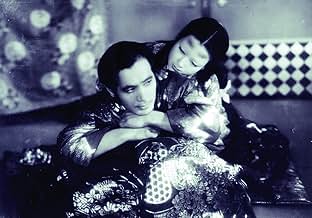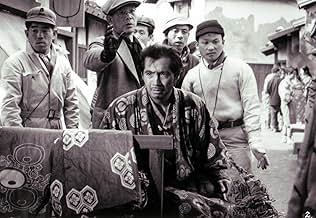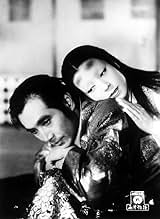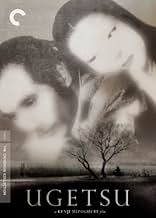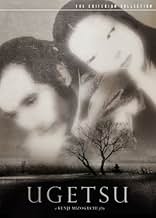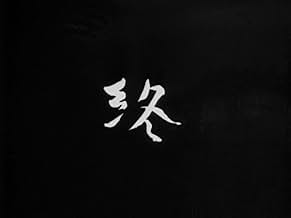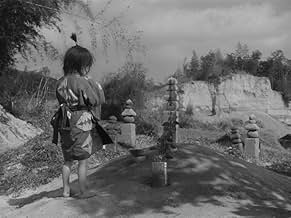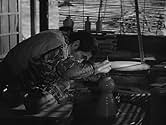IMDb-BEWERTUNG
8,1/10
27.560
IHRE BEWERTUNG
Eine Geschichte über Ehrgeiz, Familie, Liebe und Krieg inmitten des japanischen Bürgerkriegs im 16. Jahrhundert.Eine Geschichte über Ehrgeiz, Familie, Liebe und Krieg inmitten des japanischen Bürgerkriegs im 16. Jahrhundert.Eine Geschichte über Ehrgeiz, Familie, Liebe und Krieg inmitten des japanischen Bürgerkriegs im 16. Jahrhundert.
- Für 1 Oscar nominiert
- 6 Gewinne & 2 Nominierungen insgesamt
Eitarô Ozawa
- Tôbei
- (as Sakae Ozawa)
Empfohlene Bewertungen
10notmicro
This holds a special place in my heart, and I still consider it to be absolutely one of the very greatest films ever made for adults. The work of a mature artist, it resonates with Buddhist practice, and is a profoundly moving tale of the suffering of the human condition, the violence of war, the possibilities of art uplifting the spirit, the possibilities of redemption of character. The closing scene is one of such deeply-felt compassion and understanding that it is almost frightening; it prefigures in a way the stunning and more personal close of the subsequent Mizoguchi film "Sansho the Baliff".
On a lighter level, it is an amusingly sly allegory of the actual history of Japan for the 20 or so years prior to 1953, where in the end the women, embittered (or dead) as a result of their men's quixotic quest for military glory or war-profiteering, entreat them to give up their misguided and destructive dreams, settle down, and get back to their real responsibilities.
Which they did.
Originally available on LaserDisc.
On a lighter level, it is an amusingly sly allegory of the actual history of Japan for the 20 or so years prior to 1953, where in the end the women, embittered (or dead) as a result of their men's quixotic quest for military glory or war-profiteering, entreat them to give up their misguided and destructive dreams, settle down, and get back to their real responsibilities.
Which they did.
Originally available on LaserDisc.
In Japan, due to its Buddhism and Shinto culture, the term Ghost is an description for evil of the spirits world. and the idea of spirits which dispatch from its physical body are describe as phamton. from the difference associate with these 2 terms we can understand that even in spirits there is description for the good and bad spirits. this is similar to the Chinese mythology for ghost. even if the spirits was wrongly accused, and coming back to human world for its revenge, this is still consider as an spirits rather than ghost, as it has its positive of motive and would not harm people who is not associate with his death. since spirits normally does not appear in the human world, and its appearance often associate with unfinished matter or grudge. which is the main characteristic for most of the Japanese film.
the most impressive Japanese ghost story is Ugetsu monogatari(1953), it was base on the novel with the same title. we can analysis the idea of Japanese ghost film via 2 aspect of the film.
Firstly, while Genjuro was selling pottery in the market, he was been order by Lady Wakasa and its nurse maid to send the good to their mansion personally, which was the starting point of ghostly love relationship.
By the hand of prestige cinema photographer, Kuzo Miyagawa, the mystic atmosphere, the trembling music of sanmise, the ghostly voice of men grudging, gives the mansion an appeal of a haunted mansion. The use of top view camera technique with the character Noh play like appeal,gives the scene much more mysterious, secluded, ghostly, euphoria aspect of the fantasy world. which above all explores the art of Japanese traditional beauty.although it is an black and white film, but Kuzo Miyagawa create an color of bewitch ghostly character on Lady Wakasa.
The very motive for the existence of Lady wakasa was to have a taste of love, as she was kill before she can understand what love is, after resurrect by the nursemaid, she have become and spirits that looking for the ideal man to love. that is why she put a spell on Genjuro. to love not to hurt.
The second aspect for Genjuro associate with spirits was at the end part of the movie, while He push open the cripple door of his home, he saw an empty house, yet after the camera return an image of the room, Miyagi, Genjuro's wife appear, who was setting beside the stove alone tailoring clothes, and waiting for his husband to eat and change into comfy kimono, Genjuro feel extremely tire after all the events therefore he quickly falls asleep, next morning, when the villager master realize he is return went into his home and explain the tragic of her wife. and the disappearance of his son, coincidentally, his son returns in the very moment.
The movie finish with a long shot as the kid playing beside his mothers grave while Genjuro praying, which symbolize Miyagi has finally saw the father and son reunited and now he is able to rest in peace, and fly to heaven.
The movie demonstrate the childish, stubbornness and foolishness of male. yet it purify the females character as loving and sincere, which demonstrate no scary or horrifying intention to the viewer when associate with ghost. infect we associate with the idea of gentleness, shyness of its character. the eternal serenity towards the love one can only be associate with ghostly figure in a time transcend world.
the most impressive Japanese ghost story is Ugetsu monogatari(1953), it was base on the novel with the same title. we can analysis the idea of Japanese ghost film via 2 aspect of the film.
Firstly, while Genjuro was selling pottery in the market, he was been order by Lady Wakasa and its nurse maid to send the good to their mansion personally, which was the starting point of ghostly love relationship.
By the hand of prestige cinema photographer, Kuzo Miyagawa, the mystic atmosphere, the trembling music of sanmise, the ghostly voice of men grudging, gives the mansion an appeal of a haunted mansion. The use of top view camera technique with the character Noh play like appeal,gives the scene much more mysterious, secluded, ghostly, euphoria aspect of the fantasy world. which above all explores the art of Japanese traditional beauty.although it is an black and white film, but Kuzo Miyagawa create an color of bewitch ghostly character on Lady Wakasa.
The very motive for the existence of Lady wakasa was to have a taste of love, as she was kill before she can understand what love is, after resurrect by the nursemaid, she have become and spirits that looking for the ideal man to love. that is why she put a spell on Genjuro. to love not to hurt.
The second aspect for Genjuro associate with spirits was at the end part of the movie, while He push open the cripple door of his home, he saw an empty house, yet after the camera return an image of the room, Miyagi, Genjuro's wife appear, who was setting beside the stove alone tailoring clothes, and waiting for his husband to eat and change into comfy kimono, Genjuro feel extremely tire after all the events therefore he quickly falls asleep, next morning, when the villager master realize he is return went into his home and explain the tragic of her wife. and the disappearance of his son, coincidentally, his son returns in the very moment.
The movie finish with a long shot as the kid playing beside his mothers grave while Genjuro praying, which symbolize Miyagi has finally saw the father and son reunited and now he is able to rest in peace, and fly to heaven.
The movie demonstrate the childish, stubbornness and foolishness of male. yet it purify the females character as loving and sincere, which demonstrate no scary or horrifying intention to the viewer when associate with ghost. infect we associate with the idea of gentleness, shyness of its character. the eternal serenity towards the love one can only be associate with ghostly figure in a time transcend world.
In the beginning of the springtime in the period of the Japanese Civil Wars of the Sixteenth Century in Lake Biwa in the Province of Omi, the family man farmer and craftsman Genjurô (Masayuki Mori) travels to Nagahama to sell his wares and makes a small fortune. His neighbor Tobei (Sakae Ozawa) that is a fool man dreams on becoming a samurai, but he can not afford to buy the necessary outfit. The greedy Genjurô and Tobei work together manufacturing clay potteries, expecting to sell the pieces and enrich; however, their wives Miyage (Kinuyo Tanaka) and Ohama (Mitsuko Mito) are worried about the army of the cruel Shibata that is coming to their village and they warn their ambitious husbands. Their village is looted but the families flee and survive; Genjurô and Tobei decide to travel by boat with their wives and baby to sell the wares in a bigger town. When they meet another boat that was attacked by pirates, Genjurô decides to leave his wife and son on the bank of the river, promising to return in ten days. Genjurô, Tobei and Ohama raise a large amount but Tobei leaves his wife to buy the samurai outfit and seek fame and fortune. Meanwhile the female aristocratic Lady Wakasa (Machiko Kyô) and her servant ask Genjurô to bring her shopping to her fancy Kutsuki House. Sooner Genjurô and Tobei discover the price they have to pay for their ambition.
"Ugetsu Monogatari" is the first movie that I have watched of Kenji Mizoguchi and I am impressed with this masterpiece. This supernatural story is very well constructed in a historic context of the Japanese Civil Wars of the Sengoku period, with two family dramas caused by the blindness of greed. This feature is supported by a magnificent cinematography in black and white, and the scene in the foggy lake is a piece of art. The performances are awesome, and the cast really seems to be living in the Sixteenth Century in Japan. My vote is nine.
Title (Brazil): "Contos da Lua Vaga" ("Tales of the Vague Moon")
"Ugetsu Monogatari" is the first movie that I have watched of Kenji Mizoguchi and I am impressed with this masterpiece. This supernatural story is very well constructed in a historic context of the Japanese Civil Wars of the Sengoku period, with two family dramas caused by the blindness of greed. This feature is supported by a magnificent cinematography in black and white, and the scene in the foggy lake is a piece of art. The performances are awesome, and the cast really seems to be living in the Sixteenth Century in Japan. My vote is nine.
Title (Brazil): "Contos da Lua Vaga" ("Tales of the Vague Moon")
The movie starts out pretty uncomfortably, two peasants in 16th century Japan who dream of richness and glory so blindly, they can't even hear the pretty straight-forward protests of their loving wives who try to convince them that their happiness is fine at home. When one, a pottery smith, makes a small bundle selling his wares, they decide to make a much larger batch together and become rich.
Forced out of their homes by an approaching war and uncertain where to go, they take their wares to a thriving market place, where the second peasant's ambition to be a samurai divides them and causes all four characters, the two peasants and their wives, to be separated, all fending for themselves amongst the war and various classes differently.
At this point the film reverses itself and instead of being a pretty skin-deep, tragic bud of greed, it blooms into a beautiful and haunting tale of obsession and illusion. The two main stories of the peasants and their wives are opposite only in their imaged realism, where one peasant falls completely under the curse of an enchanting ghost and the other lies and steals his way to fame, only both of them are eventually knocked down from their own hubris and forced to finally awaken to what their wives have said all along.
It's quite exquisite, this movie, with its long takes and its lack of the usual constructs that make up messages of obsession and greed. Once it gets beyond the small, uncomfortable, claustrophobic world of the peasant's home, it becomes audaciously challenging and mysterious, so that the same small home becomes amazingly wonderful and comforting. The very essence of the movie is breathed into the emotions of the audience in very subtle ways, making a very unforgettable cinematic experience.
--PolarisDiB
Forced out of their homes by an approaching war and uncertain where to go, they take their wares to a thriving market place, where the second peasant's ambition to be a samurai divides them and causes all four characters, the two peasants and their wives, to be separated, all fending for themselves amongst the war and various classes differently.
At this point the film reverses itself and instead of being a pretty skin-deep, tragic bud of greed, it blooms into a beautiful and haunting tale of obsession and illusion. The two main stories of the peasants and their wives are opposite only in their imaged realism, where one peasant falls completely under the curse of an enchanting ghost and the other lies and steals his way to fame, only both of them are eventually knocked down from their own hubris and forced to finally awaken to what their wives have said all along.
It's quite exquisite, this movie, with its long takes and its lack of the usual constructs that make up messages of obsession and greed. Once it gets beyond the small, uncomfortable, claustrophobic world of the peasant's home, it becomes audaciously challenging and mysterious, so that the same small home becomes amazingly wonderful and comforting. The very essence of the movie is breathed into the emotions of the audience in very subtle ways, making a very unforgettable cinematic experience.
--PolarisDiB
This was my first Mizoguchi movie, so perhaps I watched it a little with child´s eyes. I liked it very much - it´s more fast-paced than I would expect from Japanese filmmaking. Mizoguchi is indeed a visual poet, the visual composition of every sequence looks as have been carefully planned, with much more importance given to imagery rather than dialogue. "Ugetsu" main themes, I believe, are the submission of women on feudal Japan - the transformation of the lives of the wifes of the two pottery dealers is treated very handsomely, each one striving to lead a decent life after being abandoned by their husbands, but failing in the end. The boat scene, with the encounter of a dying man, is also very beautiful. It´s a major turning point in the film, similar to a scene in Kurosawa´s "Throne of Blood" (mist, swamp, incertainty...)
Wusstest du schon
- WissenswertesThe plot is a combination of two tales from the work of Ueda Akinari called "Tales of moon and rain".
- PatzerAfter the soldier cuts off the general's head there's no blood on his sword.
- VerbindungenFeatured in De l'origine du XXIe siècle (2000)
Top-Auswahl
Melde dich zum Bewerten an und greife auf die Watchlist für personalisierte Empfehlungen zu.
- How long is Ugetsu?Powered by Alexa
Details
Box Office
- Bruttoertrag in den USA und Kanada
- 11.197 $
- Eröffnungswochenende in den USA und in Kanada
- 6.154 $
- 5. März 2017
- Weltweiter Bruttoertrag
- 24.959 $
- Laufzeit
- 1 Std. 36 Min.(96 min)
- Farbe
- Seitenverhältnis
- 1.37 : 1
Zu dieser Seite beitragen
Bearbeitung vorschlagen oder fehlenden Inhalt hinzufügen


